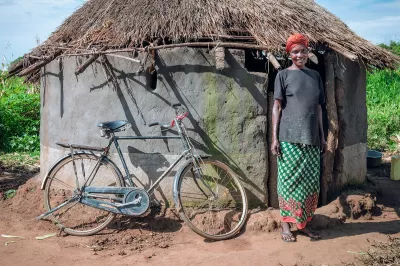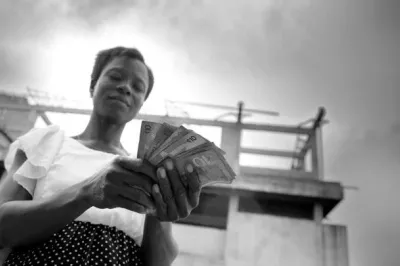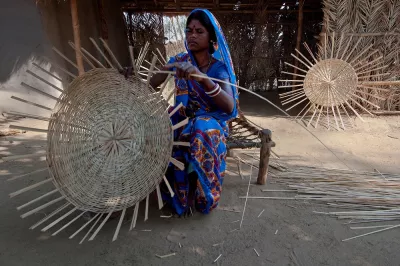Smart Phones, Smart Partners: Linking Asset Finance and Microfinance
Pay-as-you-go (PAYGo) financing for solar home systems has been suggested as an entry point to microcredit for low-income customers. But what if the relationship is more complex? The adoption of PAYGo smartphones by both unbanked customers and microfinance clients shows that links between PAYGo and microfinance can be mutually beneficial: the paths they are building run both ways, increasing access to a variety of financial services that customers can use to fit their needs.
A new paper from CGAP and FIBR, “A Tale of Two Sisters: Microfinance Institutions and PAYGo Solar,” argues that microfinance institutions (MFIs) that succeed will be the ones that acquire and service customers through a variety of partnerships, products and channels. The paper is based on work in Senegal and Uganda with PAYGo solar operators that are owned by global microfinance groups. It documents how these companies’ partnerships with local MFI affiliates have served as a two-way street: increasing low-income customers’ access to solar energy while also enabling good customers to obtain microcredit.

While the paper focuses on the links between PAYGo and microfinance within the solar home system industry, these links could play out with other types of assets, too. Smartphones are an example of an asset with broader appeal than solar home systems, whose customers are mainly off-grid and hard to reach. Smartphone financing is growing rapidly, enabled by advances in mobile money, software/firmware and flexible finance.
In Senegal, Baobab Group (formerly Microcred) offers an example of how MFIs are using smartphone finance to establish a reciprocal relationship between PAYGo and microcredit, connecting underbanked people with formal financial services while enabling microfinance clients to finance a valued asset.
How it works
In 2015, Baobab created Baobab+ to finance life-changing assets and bring more people within reach of financial services. In four countries across Africa, local Baobab+ affiliates collaborate with Baobab’s local MFI by leveraging branches as sales points and sharing IT resources. At the same time, Baobab offers digital loans to Baobab+ clients who have paid off their solar home system.

This model has worked well for both companies. In a recent pilot with CGAP in Senegal, 56 of Baobab+ PAYGo clients were able to leverage their PAYGo credit histories to access short-term loans from Baobab. They used these loans to finance working capital and household improvements, and half of the borrowers took multiple loans.
In 2018, Baobab+ began offering PAYGo smartphone and tablet financing to unbanked and banked customers, allowing them to pay over time (petit a petit) for a valued asset. The product is similar to a PAYGo solar loan: a borrower is required to pay 20 percent upfront, at which point they receive their phone. They continue to make payments for an average of five months, with each payment unlocking the smartphone for a set number of days. Once these days are used up, firmware provided by PayJoy inhibits further use of the phone (except emergency calls) until the next payment is received. When the last payment is made, the phone is permanently unlocked.
Sandrine Marmolejo, the CEO of Baobab+ Senegal, sees smartphone and tablet financing as core to her company’s growth.
"We strongly believe that PAYGo lending plays a critical role in low-income people's financial inclusion journey and that access to a smartphone and connectivity can have a tremendous impact on our clients' lives. We are working on adding even more impactful content to our smartphones to address different needs such as education, business empowerment, farming or health care. And as with our PAYGo solar customers, our PAYGo digital customers will be eligible for loans from our microfinance partners," she said.
Baobab+ has originated 4,000 PAYGo smartphone and tablet loans through its sales network and Baobab agent points. It has already found these loans to be less risky than their solar analogs, likely due to their shorter tenor and the greater priority that people place on their phones. Baobab+ has already partnered with MTN Côte d’Ivoire to offer device financing at select sales points.
Two-way street
The customer who was once too risky but who now qualifies for a microloan based on his or her asset repayment history – whether for a solar home system, smartphone or tablet – is the linear story of PAYGo-led financial inclusion. But most evolutions are not linear. In the energy sector, research has shown that households do not move in a straight line up an energy ladder. Rather, they “stack” different products together to meet growing energy needs. Likewise, financial diaries have shown that households are adept at cobbling together financial products to make ends meet.
In Senegal, PAYGo loans are also bringing real value to Baobab clients who have already moved up the financial inclusion ladder and have access to microfinance.
First, lots of people who do not have high-quality smartphones want them, particularly the urban entrepreneurs who make up Baobab’s microfinance clientele. Baobab works with Baobab+ to offer high-quality handset financing to microfinance clients in good standing. The clients get good smartphones on affordable terms, Baobab+ gets more good customers and Baobab builds a stronger relationship with its customers.
Second, Baobab is in the process of digitizing its services. Soon, its clients will be able to access a suite of financial services through the Baobab app, including account checks, loan applications and renewals. But clients need to have working smartphones if this digital transformation is going to bring them value. It is here that Baobab+ is actually financing the infrastructure for more sophisticated microfinance services.
Complementary partnerships can add value in both directions: PAYGo customers can become microfinance clients, but the reverse is also true. Not every MFI will create a subsidiary (although it’s worth exploring), but all can look for providers and client bases that have unmet financial services needs. In Zambia, for example, FINCA has worked with seed company Good Nature Agro to offer savings accounts to its agents and client farmers, most of whom FINCA has never met and will never meet.
This new reality promises to be more complex and demanding, as MFIs are asked to manage more customer channels and sources of revenue. But these additional channels can offer significant value to clients old and new.




Add new comment